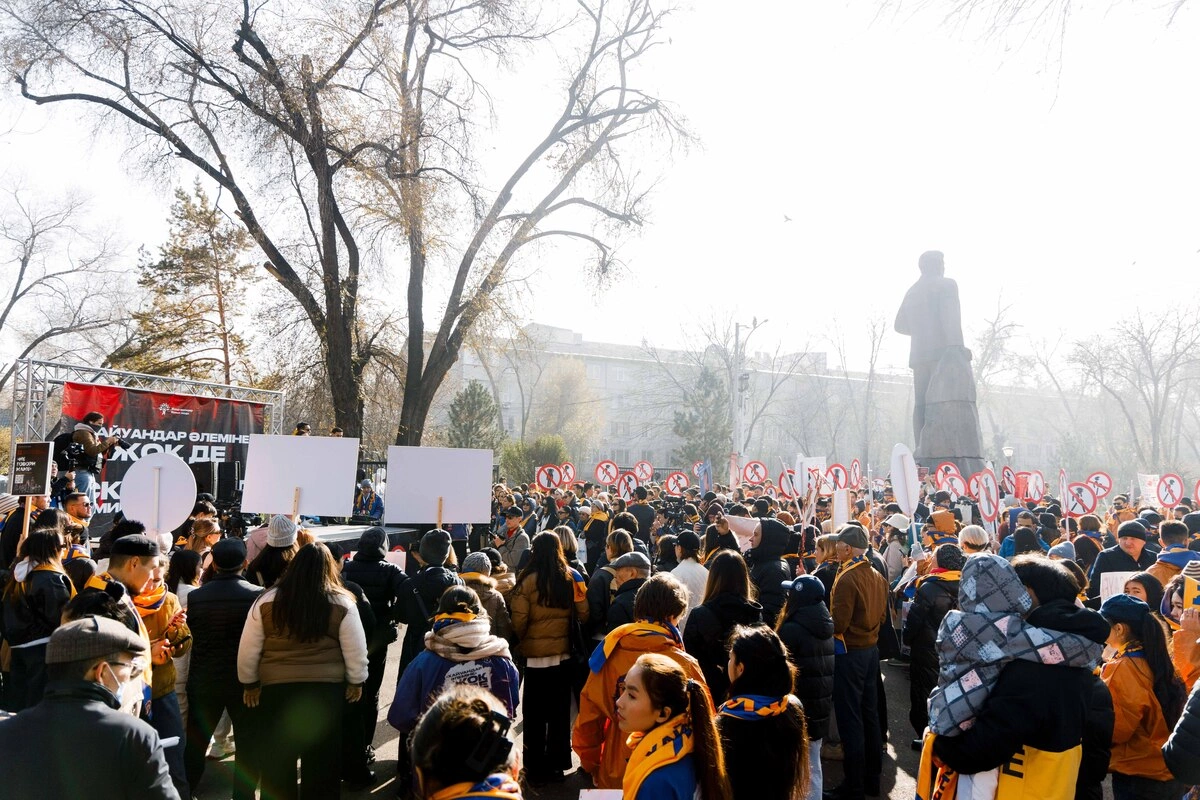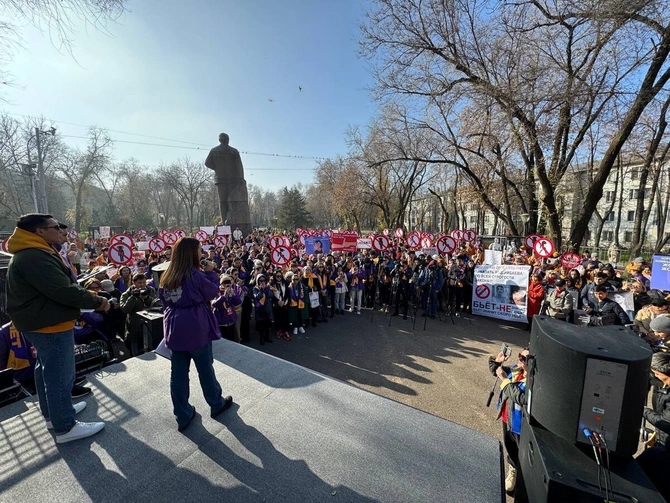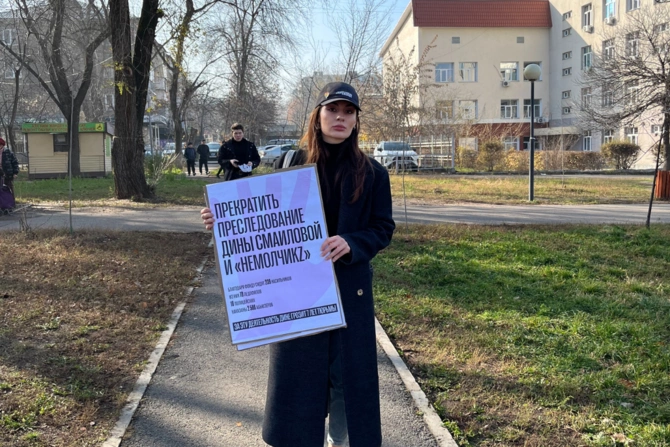
The rally against violence organized by the youth movement Zhana Adamdar on 25 November received a lot of backlash from Kazakhstan’s civil society and activists, calling the movement pro-governmental and the rally performative activism.
Image: Zhana Adamar
After the gruesome murder of Saltanat Nukenova by her husband, ex-Minister of Economy Kuandyk Bishimbayev, the public in Kazakhstan has united in their demands for harsher laws protecting women from abuse and violence in the country. The rally organized by the youth movement Zhana Adamdar (Kazakh: New People) on 25 November was one such instance where people could voice their anger about the femicide rate in Central Asia’s biggest country. However, it soon received negative feedback from the public.
The most vocal in addressing their refusal to partake in Zhana Adamdar’s rally was a non-governmental feminist initiative, Feminita. After being officially invited by the youth movement, they published their response on their Instagram page in Kazakh and Russian, explaining their position and questioning the event’s legitimacy. In response, Zhana Adamdar posted their counter-argument on their Instagram page.
Nonetheless, the rally took place in Almaty, despite the angry comments on their Instagram page calling Zhana Adamdar “pro-governmental,” criticizing the name of the rally Say No to the ‘Animal World,’ and Almaty’s akimat’s (Kazakh: mayor’s office) quick agreement to allow the rally, which compared to how other activists have to go to court to get their rallies or protests approved is rather concerning.
We reached out to both sides to make sense of this debate and find out the answers. Zhanar Sekerbayeva, a co-founder of Feminita, and Assel Badenova, a leader of Zhana Adamdar, both agreed to give interviews and comment on their opposing perspectives and views.
One of the main confusions for those criticizing this protest was its name, Say No to the ‘Animal World.’ Indeed, judging by its name, it seems that the rally is about animals, not violence against women. Zhana Adamdar’s leader, Assel Badenova, explains that they have nothing against animals and do not encourage cruel treatment of them. Instead, it is their take on drawing parallels between the law of the animal world, where the prey gets eaten by the predator, and the behaviour of human beings who “continue to live according to the rules of the animal world” and do not understand the meaning of the word ‘no.’ “When an animal doesn’t agree with something, it growls; a person can say no,” she further elaborates.
In turn, Feminita’s co-founder, Zhanar Sekerbayeva, expressed her outrage over the name. “We cannot insult or humiliate animals by comparing them to rapists because rapists are worse than animals,” the activist said, further explaining that animals in Kazakhstan are unprotected and face cruel treatment from people. “If he is a criminal, call him a criminal; if he is a rapist, call him a rapist.”
The fact that Zhana Adamdar doesn’t talk about supporting the bill for harsher sentences against violence against women is another reason why Feminita refused to take part in their rally. “Imagine a rally at which they don’t talk about the bill. Why, then, is such a rally needed?” Sekerbayeva exclaims. Badenova explains that they have nothing against the bill. Instead, they are so sure that the law will be adopted that they want to focus on further steps. “It’s very cool that now, in Kazakhstani society, the entire public has rallied around this topic. On social media, people began to tell their stories openly and to collect hundreds of thousands of signatures for the adoption of a petition; I think after all these measures, at least next year, the law will be adopted.” The Caspian Post reported previously that there was an ongoing petition with over 150,000 signatures asking the President to enforce the harsher law protecting women. Unfortunately, the Ministry of Justice refused to consider this petition due to it being created in 2021 when the petition law did not exist.

Image: Zhana Adamar
“We are worried that the people who have rallied around this topic will shake hands when the law is passed and say everything is cool and the problem is solved,” Zhana Adamdar’s leader continues. “We need to work on a more global level. When a person does not want to live according to the law, the problem is not the law, the problem is the person. You need to work with a person. Therefore, we offer the country an individual approach to changing people's thinking.”
Sekerbayeva wants to make it clear that their main criticism is not against the youth movement but that the Kazakhstani government uses young people “to praise” President Tokayev. “These are the young people who are being used,” she says. From her perspective, it is the government putting its ideas into the youth’s “mouth.” “When the state takes a group of people, in this case, Zhana Adamdar, and only allows them to speak on a given topic, there is a danger that the state gives an advantage to only one group of people…because this group is close to the state,” Sekerbayeva says. “It reflects the principles that the state ideology is now spreading that we have a new Kazakhstan, that everything is fine with us, and that we are undergoing democratic changes.”
Badenova says that although they support President Tokayev, calling them pro-governmental would be wrong. “The Zhana Adamdar movement is a movement that is growing from the bottom up; no one created us artificially. We indeed support the president, his ideas fit us, but it would be wrong to call us the Ak Orda’s (Kazakh: White House) because the obstacles we encountered when preparing the last rally indicate that not everything is so simple.” Among the obstacles, she states that they were banned from campaigning for people to attend the rally and some were even threatened with expulsion from their universities. Besides that, Badenova further states they had to give up on their initial idea to hold a march for 1000 people, and after “very difficult negotiations” with Almaty’s akimat, they had to agree to change the format and reduce the number by half.
However, not everyone opposed the rally. KazFem’s activist, Veronica Fonova, decided to go and show her support for the continuous new openings of cases against another activist, Dina Smailova. Fonova arrived with three posters in Kazakh and Russian in support of Smailova. “They all had the same meaning: that Dina was supporting the women and children of Kazakhstan, statistics on how many cases were closed, how many criminals were imprisoned, and that the state was going after her. One of them said, ‘Imprison rapists, not human rights activists.’” However, when Fonova came closer to the entrance—the venue was fenced off and surrounded by police, and those who wanted to join had to register via the QR code—she was not allowed to enter with her posters. “Are you holding a rally against violence?” the activist asked, “Yes,” said the Zhana Adamdar volunteer, “Well, I have a poster against violence.”

Image: Veronica Fonova
“There was strong pressure from the Almaty akimat, and we were told that if some people came with posters not related to the topic of violence, according to the law, they have the right to stop the action,” the leader of the youth movement explains, echoing the words of the volunteer at the rally.
Fonova refused to attend the rally without her banners but noticed the banners that were allowed in. “At the rally, they had these ‘circles on a stick’ with ‘minotaurs’ crossed out. It was very funny because it seemed like it was a rally against minotaurs,” the activist comments. “There were also people with the heads of roosters, goats, etc. There were two cells smeared with blood. It looked so crazy.” Fonova agrees with the majority, saying that the rally would have received far more support from the civil society had they changed the name of it. “Everywhere they had these animals crossed out. Our animals already have a bad life in Kazakhstan.”
The activist posted a TikTok sharing her experience and demonstrating the event and her interaction with the Zhana Adamdar volunteer. It has over 60 thousand views and comments supporting her position.
Like Fonova, Sekerbayeva is outraged by the rally turning into an absurd show. “What kind of performance was this? What is that cell? Why are there mannequins? Are you ready to support this carnival of absurdity?” She further explains that instead of talking about women's rights, they praised President Tokayev.
There is no evidence that the youth movement receives financial aid from the government. “Our movement is sponsored by private individuals. There were people who supported our intellectual startup. Today, these people are not public, but maybe over time, they will make a decision to talk about themselves,” Badenova says. However, judging by the fact that the rally was approved for a movement that openly sympathizes with President Tokayev and echoes his words about New Kazakhstan—a term widely used by Tokayev after the January 2022 unrest in Kazakhstan—while prohibiting rallies of other activists for the same topic is disturbing. For example, Feminita was not granted permission to hold their rallies on 9 December in five different cities: Aktau, Almaty, Astana, Kyzylorda, and Taraz.
Both Fonova and Sekerbayeva are afraid that by using such movements as Zhana Adamdar as their tools, the state will have the opportunity to claim that they allow rallies and protests in the country. While those activists who have been talking about political and social issues in the country will further be silenced and censored. “They fill the space with such activists,” Sekerbayeva says. “People have a constitutional right to come out to peaceful protests and express their opinions, joy, and dissatisfaction.”
At the end of our interview, Feminita’s co-founder shares bad news. Their annual Women’s Rights rally for International Women’s Day was not approved. The reason, as she calls it, is “extraordinarily absurd”. The topic of the rally, Freedom and Safety of Kazakhstani Women, was deemed “a threat to public safety” by the government. “It turns out that talking about the freedom and safety of women in Kazakhstan is a threat to the public. This is what we've come to. We will not give up; we will go to court, use all legal methods to restore justice, and go to a rally or march dedicated to women's rights.”
Share on social media